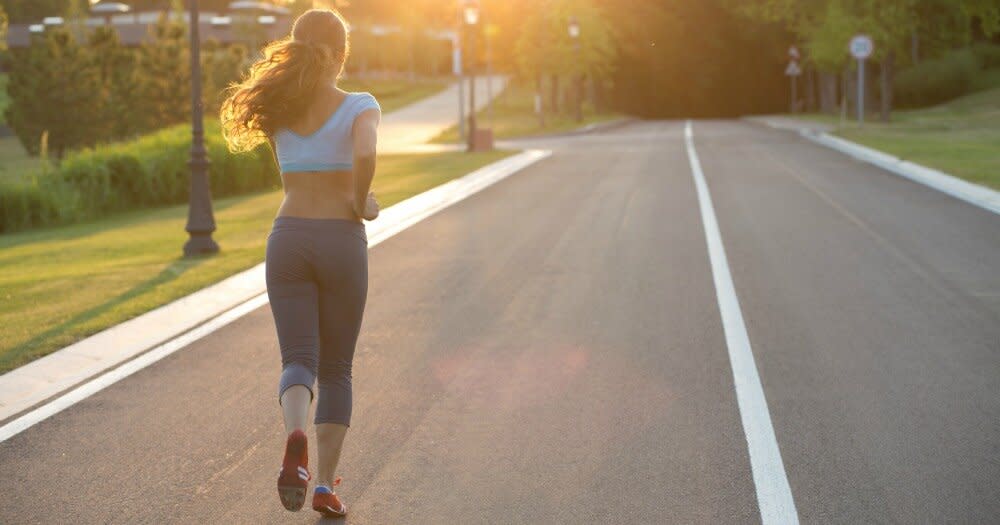How a Car Accident Changed the Way I Prioritized My Health

I sucked at working out.
I could never pull off a graceful burpee. My form never seemed quite right in yoga. I'd need to take a break-or, OK, multiple breaks-in between reps of lunges, push-ups, everything. Actually, that's not true. I didn't take breaks. I quit. I was less #fitspo and more #fitsno. I was basically the opposite of the glistening fitness Instagrammers. Red-faced, spaghetti-arms shaking, collapsing into puddles of sweat. That was me.
But then I started running.
At that point, I had given up on the group fitness scene because I was a) terrible and b) had a work schedule that was hard to plan around. But my health was important to me, and I wanted to do something good for my body, so I decided to give running a try. No judgy eyes watching me, and I could do it whenever I wanted. Sure, I had run in high school and had even done a few random races with friends as I'd gotten older. But I had never really fallen into a stride with the sport.
A dark evening, just a little moonlight, late into January. That was the moment I became a runner.
Physically, it felt great, but it was about more than that. The rhythm of running has a way of putting the planet in front of you in slow motion-chalky-colored moons on late runs and dusky purple skies on early ones. Soft snowflakes and heavy raindrops. Golden summer sun so thick it feels like you're running through curtains and deep inky darkness that inspires you to go faster. I felt like my body was somehow in sync with the world, but maybe more importantly, I felt in sync with myself.
That wasn't the case on a dark evening in January, years after I had discovered running. I was walking home from work and was halfway through a crosswalk when I heard screams. Before I knew it, I was tossed on top of the hood of a car and tumbling back to the ground. The car had barreled through the intersection. The driver fled the scene and I was taken by ambulance to the hospital. My legs had taken the brunt of the hit. I still have the pair of black dress pants I was wearing with what looks like singe marks all over them (from the heat of the car, the imprint of a tire-I don't know). A doctor told me I may have a shattered kneecap. But after tests, X-rays, and lots of poking and prodding, I walked-with a hobble-out of the hospital. I was told to rest: No work for a few days and no exercise for a while.
I was determined to get back on my feet and started running long before I should have. My knee would swell and throb, but I would do it anyway. For the first time, running felt hard. Not hard in the way it feels to go out and tackle a long run or to push yourself when you know you have a little more to give-but hard in the way that it didn't feel natural, good, or right.
I sucked at working out again.
I thought the fix was to push myself harder. I became consumed with tracking my distance and pace, telling myself that to retrain my body I needed to run every day. I was pounding the pavement, driven by angst, anger, and obsession. The car accident hadn't just left me paranoid about crossing the street or looking at every passing gray car and questioning if it was The One. It had taken something really important to me-my identity as a runner. My health became secondary to getting that feeling back.
After one particularly brutal run, I had a moment: When did the act of working out start to trump my health? Why would you hurt yourself in the name of fitness? Isn't the point of exercise to make your body stronger? I know I'm not alone in the struggle to find this balance. "When exercise is taken to an extreme, it can manifest itself as an addiction," says Leah Lagos, Ph.D., a clinical and sports psychologist in New York City. Exercising despite being injured is one of the biggest signs, she says.
I decided to take a break and listen to my body. My sneakers sat unlaced for months. I allowed my body to heal. I ate healthily and worked out with a Pilates teacher who gently stretched my muscles and made them stronger. Today, I'm back to approaching my wellness in a very holistic way. I don't track my distance, my pace, or how many days I've run-because it's not important to me. My body tells me how it feels, so some days I run, and other days I'm perfectly fine taking a rest. It took a car accident for me to realize it, but sometimes taking it easy is the best thing you can do for your health.

